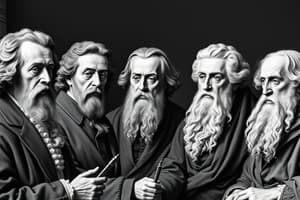Podcast
Questions and Answers
Vilken av följande är en viktig aspekt av upplysningen?
Vilken av följande är en viktig aspekt av upplysningen?
- Främjande av feodala strukturer
- Utmaning av traditionella sociala hierarkier (correct)
- Betoning på religiös intolerans
- Förnekande av individens rättigheter
Vilken begränsning av upplysningen handlar om bristande social rättvisa?
Vilken begränsning av upplysningen handlar om bristande social rättvisa?
- Förnekande av utbildning för kvinnor
- Ignorera de lägre klasserna (correct)
- Främja koloniala agendor
- Stödja rasdiskriminering
Vad ifrågasatte förespråkare för religiös tolerans under upplysningen?
Vad ifrågasatte förespråkare för religiös tolerans under upplysningen?
- Behovet av utbildning
- Individens frihet
- Religiösa ritualer
- Kyrkans auktoritet (correct)
Vilken följd av upplysningen påverkade moderna demokratier mest?
Vilken följd av upplysningen påverkade moderna demokratier mest?
Vilken aspekt av upplysningen ignorerades ofta av dess tänkare?
Vilken aspekt av upplysningen ignorerades ofta av dess tänkare?
Vilken av följande påståenden beskriver bäst en central idé under upplysningen?
Vilken av följande påståenden beskriver bäst en central idé under upplysningen?
Vilken upplysningstänkare förespråkade idén om naturens rättigheter?
Vilken upplysningstänkare förespråkade idén om naturens rättigheter?
Vad innebar begreppet 'socialt kontrakt' enligt Jean-Jacques Rousseau?
Vad innebar begreppet 'socialt kontrakt' enligt Jean-Jacques Rousseau?
Vilken upplysningstänkare föreslog en separation av makterna för att förhindra tyranni?
Vilken upplysningstänkare föreslog en separation av makterna för att förhindra tyranni?
Vilken av följande karaktäriserar bäst upplysningens syn på vetenskaplig metod?
Vilken av följande karaktäriserar bäst upplysningens syn på vetenskaplig metod?
Vilken idé var INTE en del av upplysningen?
Vilken idé var INTE en del av upplysningen?
Hur påverkade upplysningen de amerikanska och franska revolutionerna?
Hur påverkade upplysningen de amerikanska och franska revolutionerna?
Vilken upplysningstänkare kritiserade maktmissbruk av kyrkan och staten?
Vilken upplysningstänkare kritiserade maktmissbruk av kyrkan och staten?
Flashcards
Social reform under upplysningen
Social reform under upplysningen
En rörelse som utmanade traditionella sociala hierarkier och bidrog till uppkomsten av demokratiska ideal.
Religiös tolerans under upplysningen
Religiös tolerans under upplysningen
Företrädare för religiös tolerans ifrågasatte kyrkans auktoritet och förespråkade separationen av kyrka och stat.
Utbildning under upplysningen
Utbildning under upplysningen
Upplysningen främjade ökad tillgång till utbildning och bättre läskunnighet, vilket gjorde det möjligt för nya idéer att spridas lättare.
Kritik mot upplysningen: Försummelse av lägre klasser
Kritik mot upplysningen: Försummelse av lägre klasser
Signup and view all the flashcards
Kritik mot upplysningen: Könsojämlikhet
Kritik mot upplysningen: Könsojämlikhet
Signup and view all the flashcards
Upplysningen
Upplysningen
Signup and view all the flashcards
Förnuft i Upplysningen
Förnuft i Upplysningen
Signup and view all the flashcards
Individualism i Upplysningen
Individualism i Upplysningen
Signup and view all the flashcards
Skepticism mot auktoritet i Upplysningen
Skepticism mot auktoritet i Upplysningen
Signup and view all the flashcards
Naturliga rättigheter
Naturliga rättigheter
Signup and view all the flashcards
Samhällskontraktet
Samhällskontraktet
Signup and view all the flashcards
Maktdelning
Maktdelning
Signup and view all the flashcards
Upplysningens inverkan på revolutionerna
Upplysningens inverkan på revolutionerna
Signup and view all the flashcards
Study Notes
Defining the Enlightenment
- The Enlightenment, also known as the Age of Reason, was an intellectual and philosophical movement that dominated Europe during the 18th century.
- It emphasized reason, individualism, and skepticism towards traditional authority.
- Key figures championed the importance of human rights and challenged existing social and political structures.
- The movement's core principles profoundly influenced the American and French Revolutions.
Key Characteristics of the Enlightenment
- Emphasis on Reason: Enlightenment thinkers used reason and logic to understand the world and solve problems, questioning tradition and dogma.
- Individualism: The focus shifted to individual rights and freedoms, with natural rights becoming central.
- Skepticism towards Authority: There was a growing distrust of absolute monarchy and organized religion as sole sources of truth or power.
- Scientific Method: The scientific revolution's emphasis on observation, experimentation, and empirical evidence heavily influenced Enlightenment thinkers.
- Progress and Reform: Enlightenment thinkers believed society could improve through reason and education, fostering reform within existing institutions.
Notable Enlightenment Thinkers and Their Ideas
- John Locke: Advocated for natural rights (life, liberty, and property), limited government, and the right of revolution.
- Jean-Jacques Rousseau: Proposed the social contract, where individuals surrender rights for protection and social order, championed popular sovereignty.
- Baron de Montesquieu: Advocated for the separation of powers in government to prevent tyranny, influencing the US Constitution's checks and balances.
- Voltaire: Strongly advocated for freedom of speech and religious tolerance, criticizing abuses of power.
- Immanuel Kant: Influenced ethical philosophy with the categorical imperative, arguing individuals should act according to universalizable principles.
Impact of the Enlightenment
- Political Revolutions: Enlightenment ideas (natural rights, popular sovereignty, separation of powers) directly inspired the American and French Revolutions.
- Social Reform: The movement challenged social hierarchies and promoted democratic ideals.
- Religious Tolerance: Advocates questioned Church authority, promoting separation of church and state.
- Education and Literacy: Encouraged greater access to education and literacy, spreading ideas.
Limitations of the Enlightenment
- Disregard for Lower Classes: The focus on reason and individualism sometimes neglected the lower classes and social equality.
- Gender Inequality: Many Enlightenment thinkers held traditional gender roles and didn't advocate for women's equality.
- Colonialism: Enlightenment ideals of reason and progress were sometimes used to justify colonialism and exploitation.
- Racial Inequity: Enlightenment thinkers didn't consistently address racial inequality, often accepting racist viewpoints.
Legacy of the Enlightenment
- The Enlightenment's emphasis on reason, individual rights, and social progress continues to shape political thought and social discourse today.
- Its principles form the foundation for many contemporary democratic societies.
- Advancements in science, technology, and societal reform owe a debt to the Enlightenment.
Studying That Suits You
Use AI to generate personalized quizzes and flashcards to suit your learning preferences.




